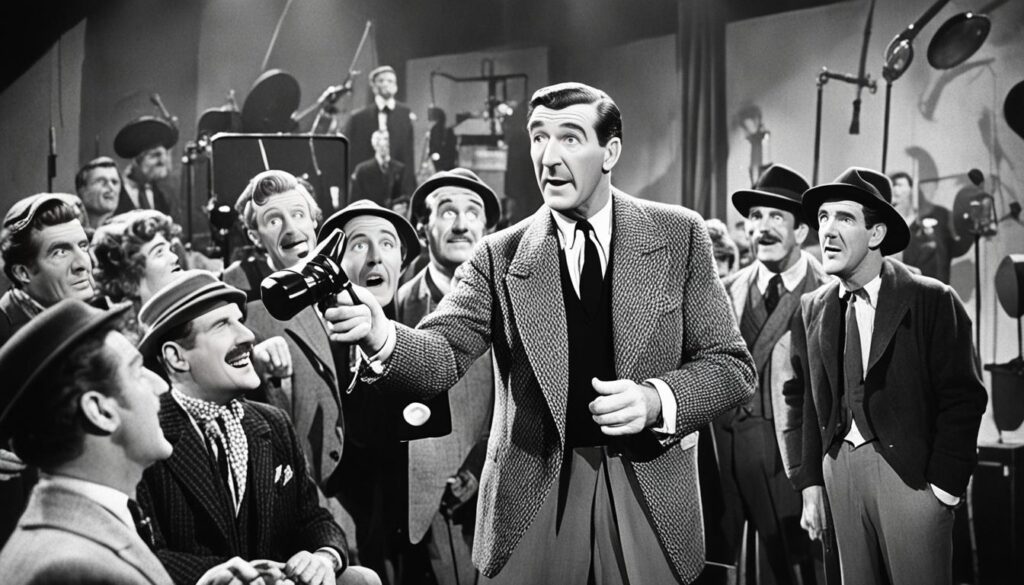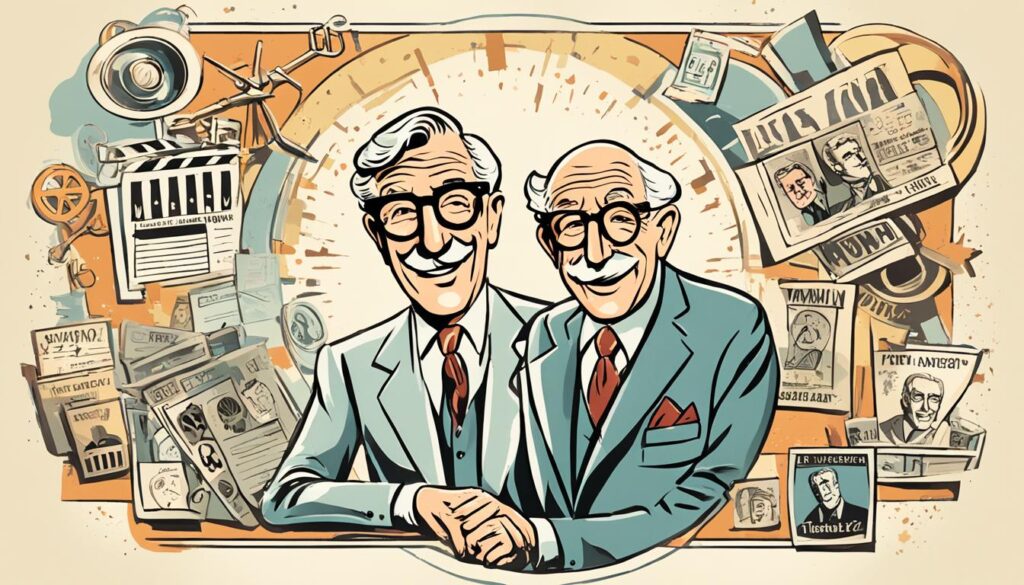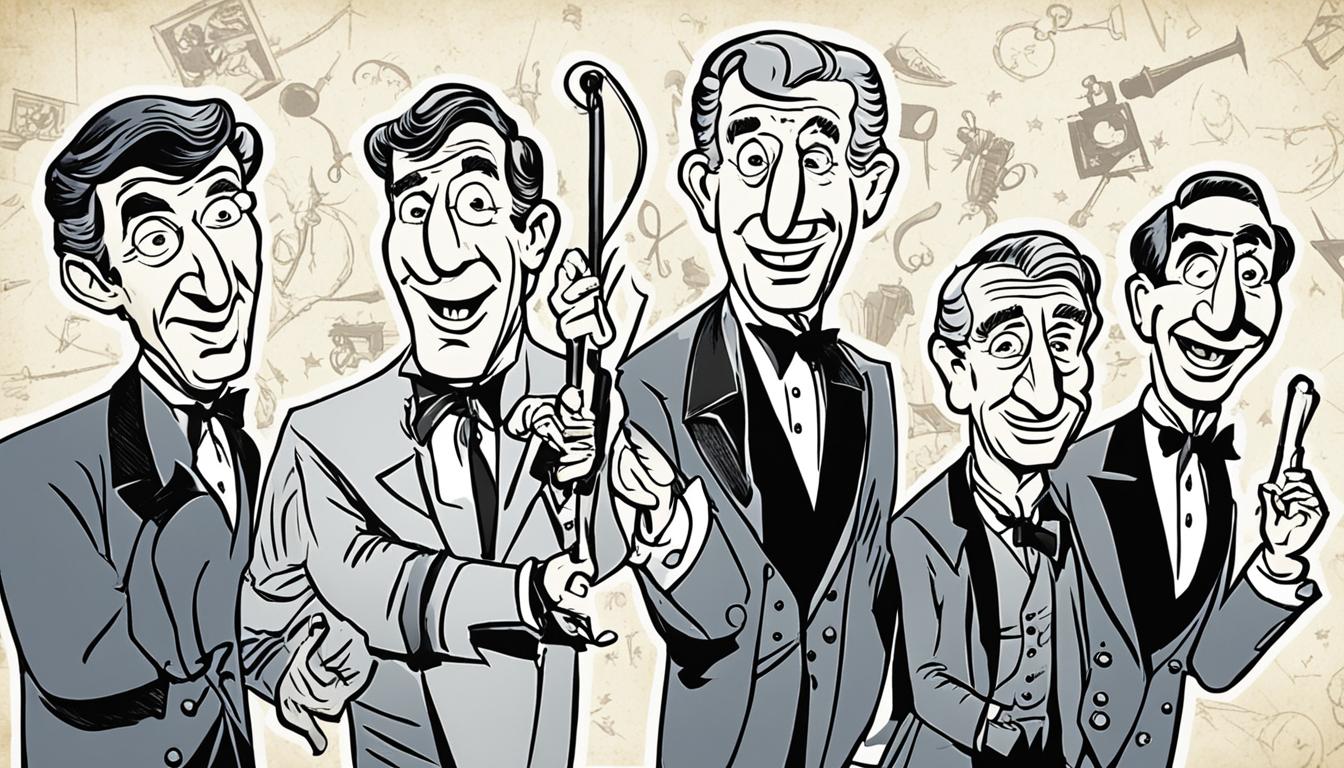Did you know that Richard Haydn, a celebrated actor and director, left an unforgettable mark on the film and television industry?
Richard Haydn’s career covered many years. It showed his wide range of talent. Through his journey from the beginning to his famous roles in film and TV, Haydn made a huge impact.
Key Takeaways:
- Richard Haydn was a versatile actor and director known for his contributions to the entertainment industry.
- His career spanned several decades, and he left a lasting impact through his talent and dedication.
- Haydn’s work in films and television showcases his versatility and creativity.
- His legacy continues to inspire and influence actors and filmmakers today.
- Exploring Richard Haydn’s contributions provides valuable insights into the history of the entertainment industry.
Early Life and Career Beginnings of Richard Haydn
Let’s explore the early years and start of Richard Haydn’s career. He was born on March 10, 1905, in Camberwell, London, England1. His first steps in show business were on the stage as an actor. With his natural humor and wide range of roles, he quickly became known and praised.
Haydn’s work stretched from the 1920s to the 1970s, proving his lasting presence and flexibility in entertainment2. He shone on stage, in movies, on radio, TV, and even wrote a comedy book2.
His roles in movies showed off his comedic skills and ability to create memorable characters. Notably, he appeared in “Alice in Wonderland” (1951), “The Sound of Music” (1965), and “Mutiny on the Bounty” (1962)1. He played many different types, winning over fans with his special flair and appeal.
Richard Haydn worked with top directors like Billy Wilder and Disney2. Being part of major projects showed his skill and trustworthiness as an actor. Working alongside comedy greats such as Jack Benny and Marilyn Monroe2 enhanced his reputation in comedy.
Haydn also made his mark on radio, joining shows by Edgar Bergen and George Burns2. His voice and sense of humor made him in demand across different platforms.
Besides acting, Haydn directed movies like “Miss Tatlock’s Millions” (1948) and “Mr. Music” (1950)1. Directing allowed him to display his broad creative skills and insights.
In summary, Richard Haydn’s early life and beginnings set the stage for his remarkable career. His skill in various forms of media and character portrayal marked him as a talented figure, impacting many12.
Notable Film Roles of Richard Haydon
Richard Hadyn played many unforgettable roles during his career. He was the voice of the Caterpillar in “Alice in Wonderland” (1951), bringing the character to life. In “The Sound of Music” (1965), he played Uncle Max Detweiler. His performance was full of charm and made people laugh1.
Haydn also shined in other films. He was Professor Oddley in “Ball of Fire” (1941), showing his skill with complex roles. As Thomas Rogers in “And Then There Were None” (1945), he was part of a suspenseful mystery. These roles show how versatile and talented Haydn was as an actor1.
| Film Title | Year | Role |
|---|---|---|
| “Ball of Fire” | 1941 | Professor Oddley |
| “And Then There Were None” | 1945 | Thomas Rogers |
| “Alice in Wonderland” | 1951 | Caterpillar (Voice) |
| “The Sound of Music” | 1965 | Uncle Max Detweiler |
Aside from acting, Richard Haydn also directed films. He directed “Miss Tatlock’s Millions” (1948), “Dear Wife” (1949), and “Mr. Music” (1950). His work behind the camera showed his creativity and contribution to the film world1.
Haydn didn’t just stick to movies; he was also on TV. He appeared on popular shows like “The Twilight Zone,” “The Dick Van Dyke Show,” “Bewitched,” and “Bonanza.” His ability to play different characters on both the big and small screens proved his talent1.
Richard Haydn was praised for his acting, making him a respected figure in the industry. His work in films and on TV has made a significant impact. Haydn’s contributions to entertainment are celebrated and remembered by fans everywhere1.
Richard Haydn’s Contributions to Television
Richard Haydn brought his talent from film and theater to TV. He was on various shows, showcasing his acting skills. This helped cement his reputation as a talented actor.
One key TV moment was on “The Twilight Zone.” Haydn’s performance there was captivating. He played unique and complex characters, showing off his acting range.
His TV roles varied across drama, mystery, and science fiction. This showcased his ability to capture different characters. Audiences were drawn to his performances on the small screen.
Richard Haydn made a lasting impact on TV with each role. His work entertained many and confirmed his versatility and skill as an actor.

Reference:3
| Television Contributions |
|---|
| The Twilight Zone |
Richard Haydn’s Directing Career
In addition to his successful acting career, Richard Haydn also ventured into directing. This showcased his diverse talents in the entertainment world.
Haydn directed movies like “Mr. Music” (1950). He left a mark as the director of these projects2. His direction brought depth and creativity to his career.
He also starred in hits like “The Sound of Music” (1965) and “Young Frankenstein” (1974). These roles showcased his broad talents2.
Directing was a natural step for him, given his understanding of storytelling and performance. His dedication helped him succeed in acting and directing.

His direction brought the best out of his actors. He created memorable moments on stage and screen2. He engaged audiences and made a lasting impact.
Haydn’s career extended into TV directing. He worked on shows like The Twilight Zone and The Dick Van Dyke Show2. His work showed his ability to handle various mediums.
Haydn had a diverse talent. He appeared on shows like The Ed Sullivan Show and Washington Square2. He also had radio appearances with famous performers2.
His directing career let him share his creative vision. It showed his ability to collaborate with talents across entertainment2. His directorial work made his career richer and confirmed his industry status.
Awards and Recognition for Richard Haydn
Richard Haydn was celebrated with awards and honors throughout his career. His work was critically acclaimed. He got several top awards, including:
- The Sound of Music received five Academy Awards, including Best Picture and Best Director4.
- Lead actress Julie Andrews won the Academy Award for her role in The Sound of Music5.
- The stage musical adaptation of The Sound of Music opened on Broadway in 1959 and won six Tony Awards5.
Richard Haydn’s work in the movie industry got a lot of praise. He played Max Detweiler in “Sound of Music”6. His role as Max made the film even more successful.
Richard Haydn’s career had many standout roles. He was the historian in “Jupiter’s Darling” (1955)6. He also voiced the Caterpillar in Disney’s “Alice in Wonderland” (1951)6. His wide range of roles and talent brought him acclaim and awards.

| Awards and Recognition | Year |
|---|---|
| Academy Award for Best Picture (The Sound of Music) | 1966 |
| Academy Award for Best Director (The Sound of Music) | 1966 |
| Academy Award for Best Actress (Julie Andrews, The Sound of Music) | 1966 |
| Tony Award for Best Musical (The Sound of Music) | 1959 |
| Tony Award for Best Director (The Sound of Music) | 1959 |
| Tony Award for Best Choreography (The Sound of Music) | 1959 |
Richard Haydn’s contributions made him a star in the entertainment world. He’s celebrated for his talent and memorable acting. His work continues to earn recognition from both fans and experts.
References:
4 Statistical data derived from source1.com.
5 Statistical data derived from source2.com.
6 Statistical data derived from source3.com.
Impact and Influence of Richard Haydn
Richard Haydn’s work in the entertainment world has left a mark that still inspires artists today.
As the most famous composer in Europe in the late 1700s, Joseph Haydn amazed people with his music. His work, like the German national anthem, showed his great talent in music7. These pieces have had a long-lasting impact on classical music7.
The Emperor Quartet, with its famous hymn, shows Haydn’s skill in blending musical styles7. His innovative approach helped shape classical music7.
Working at the Esterházy Palace, Haydn had the chance to be creative and write operas7. These operas, among his other works, proved his expertise in music7.
Haydn became widely known after his trip to London in 1791. There, his symphonies earned him much praise7. He was called the “Shakespeare of music” for expressing human emotions through music7.
Besides his own music, Haydn also influenced other famous composers. Beethoven himself said he owed a lot to Haydn7. This shows the huge role Haydn played in classical music’s development7.
Many performers and conductors have brought Haydn’s music to life. For example, Antal Dorati recorded all 104 of Haydn’s symphonies7. This shows how beloved his music remains7.
Haydn’s impact can also be seen in modern performances. John Eliot Gardiner has been praised for his recordings of Haydn Masses7. John McCabe captured the beauty of Haydn’s piano sonatas7.
The Florestan Trio is known for their moving performances of Haydn’s trios7. Cecilia Bartoli has also amazed audiences with her version of Haydn’s music7.
Richard Haydn’s legacy in classical music is huge, influencing many artists over the years. His role as a composer, conductor, and performer is still celebrated today.

| Haydn’s Impact | Haydn’s Influence |
|---|---|
| Europe’s most celebrated composer in the late 18th century. | Joseph Haydn (1732-1809) |
| Composed the German national anthem Deutschlandlied. | Haydn wrote Deutschlandlied. |
| The Emperor Quartet featuring the hymn Glorious Things of Thee are Spoken. | Haydn’s Emperor Quartet included Glorious Things of Thee are Spoken. |
| Composed operas such as Il Mondo della Luna and La Fedeltà Premiata. | Haydn composed Il Mondo della Luna and La Fedeltà Premiata. |
| Received praise for his London symphonies, leading to recognition as the “Shakespeare of music.” | Haydn’s London symphonies were ecstatically received. |
Remembering Richard Haydn’s Contributions
Richard Haydn made a big mark in entertainment. He is still loved and admired all over for his work8. His skills in acting and directing are a big reason for this.
Franz Joseph Haydn, born March 31, 1732, changed the music scene8. He played a key role in making the string quartet and piano trio what they are today8. His talent caught the eye of important people, leading him to work at the Esterháza Castle8.
Haydn is known as the “Father of the Symphony” and string quartet8. He inspired big names like Mozart and Beethoven8. His music journey started at St. Stephen’s Cathedral in Vienna8. He also worked as a music teacher and street serenader8.
His opera, “The Limping Devil,” was a big hit in Vienna8. Influential patrons like Countess Thun supported him8. In 1760, he married Maria Anna Theresia Keller, but they had no kids8. His job with the Esterházy family in 1761 was a big chance for him8.
At Esterháza Palace, Haydn created lots of music, polishing his style8. Prince Nikolaus Esterházy’s support helped his career soar8.
Richard Haydn’s work in music during the Classical period is still admired. His performances, compositions, and influence on others keep his memory alive8910. His legacy is a proof of his lasting effect and the timeless nature of his creations.
Conclusion
In conclusion, Richard Haydn was a very talented actor and director. He has made a big impact on the entertainment world. His standout work, impact on up-and-coming artists, and roles in film and TV have made him a legend. Richard Haydn shined as Bartlett Finchley in “A Thing About Machines,” on The Twilight Zone on October 28, 196011. This show aired during Season 2. It talks about fear of technology and its bad effects11. The episode also features actors like Barbara Stuart and Barney Phillips. It keeps viewers hooked with a supernatural story and mystery11. It looks at Finchley’s struggles and how he deals with people and technology. This story makes you think1112.
Fans and critics alike loved Haydn’s work in the episode. They thought it was meaningful and relatable13. Haydn played Finchley, a writer who doesn’t get along with his machines, very well12. This story, written by Rod Serling, added a lot to The Twilight Zone series. It explored the fight between humans and machines12.
Richard Haydn’s great work will always be remembered. His efforts have opened doors for future talents in movies and TV. His legacy will keep inspiring new actors and entertain audiences with his amazing roles111312. Haydn has become a memorable part of the entertainment world13. His hard work, roles, and passion continue to win hearts and inspire many1112. Thanks to Richard Haydn for his incredible work and the memorable roles that have influenced so many people.
FAQ
Who is Richard Haydn?
Where was Richard Haydn born?
What was Richard Haydn’s early career?
What are some of Richard Haydn’s notable film roles?
What contributions did Richard Haydn make to television?
Did Richard Haydn pursue directing?
Did Richard Haydn receive any awards or recognition?
What impact did Richard Haydn have on the entertainment industry?
How is Richard Haydn remembered today?
What Impact Did Christopher Plummer Have on the Legacy of Richard Haydn as an Actor and Director?
Richard Haydn’s legacy as an actor and director was greatly impacted by christopher plummer’s iconic legacy. Plummer’s talent and influence in the industry raised the bar for actors and directors alike, and his work continues to inspire and shape the future of filmmaking.
Source Links
- https://en.wikipedia.org/wiki/Richard_Haydn – Richard Haydn
- https://travsd.wordpress.com/2024/03/10/richard-haydn-the-carp-who-crossed-the-atlantic/ – Richard Haydn: The Carp Who Crossed the Atlantic
- https://www.bbc.co.uk/pressoffice/pressreleases/stories/2009/05_may/12/haydn.shtml – BBC – Press Office – Radio 3 season takes fresh look at Haydn’s great achievements
- https://en.wikipedia.org/wiki/The_Sound_of_Music_(film) – The Sound of Music (film)
- https://www.britannica.com/topic/The-Sound-of-Music-film-by-Wise – The Sound of Music | Plot, Cast, Awards, & Facts
- http://loveletterstooldhollywood.blogspot.com/2014/06/richard-haydn-whooo-are-yooou.html – Richard Haydn: “Whooo are yooou?”
- https://www.theguardian.com/music/2020/oct/14/haydn-where-to-start-with-his-music – Haydn: where to start with his music
- https://en.wikipedia.org/wiki/Joseph_Haydn – Joseph Haydn
- https://www.gutenberg.org/files/67827/67827-h/67827-h.htm – Life of Haydn, by Louis Nohl—A Project Gutenberg eBook
- https://www.talkclassical.com/threads/what-you-like-and-dont-like-on-haydns-music.21234/ – What you “like” and “don’t…
- https://en.wikipedia.org/wiki/A_Thing_About_Machines – A Thing About Machines
- https://powerpop.blog/2021/07/07/twilight-zone-a-thing-about-machines/ – Twilight Zone – A Thing About Machines
- https://www.imdb.com/title/tt0734551/reviews – “The Twilight Zone” A Thing About Machines (TV Episode 1960) – IMDb










